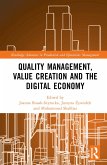Management, Organizations and Contemporary Social Theory
Herausgeber: Clegg, Stewart; Cunha, Miguel Pina E
Management, Organizations and Contemporary Social Theory
Herausgeber: Clegg, Stewart; Cunha, Miguel Pina E
- Gebundenes Buch
- Merkliste
- Auf die Merkliste
- Bewerten Bewerten
- Teilen
- Produkt teilen
- Produkterinnerung
- Produkterinnerung
Social theorists speculate about large-scale social questions, asking of any phenomenon, how is it possible? This book addresses how social theories contribute key insights into the nature of organizations and management. Chapters include objectives, reflective questions and a glossary.
Andere Kunden interessierten sich auch für
![Management, Education and Competitiveness Management, Education and Competitiveness]() Management, Education and Competitiveness186,99 €
Management, Education and Competitiveness186,99 €![Corporate Cash Management, Excess Cash, and Acquisitions Corporate Cash Management, Excess Cash, and Acquisitions]() Jarrad V. T. HarfordCorporate Cash Management, Excess Cash, and Acquisitions217,99 €
Jarrad V. T. HarfordCorporate Cash Management, Excess Cash, and Acquisitions217,99 €![Quality Management, Value Creation, and the Digital Economy Quality Management, Value Creation, and the Digital Economy]() Quality Management, Value Creation, and the Digital Economy167,99 €
Quality Management, Value Creation, and the Digital Economy167,99 €![Knowledge Management, Trust and Communication in the Era of Social Media Knowledge Management, Trust and Communication in the Era of Social Media]() Knowledge Management, Trust and Communication in the Era of Social Media57,99 €
Knowledge Management, Trust and Communication in the Era of Social Media57,99 €![Sustainable Business, Management, and Economics Sustainable Business, Management, and Economics]() Sustainable Business, Management, and Economics52,99 €
Sustainable Business, Management, and Economics52,99 €![Letter to George Carr Glyn, Esq., M.P., Chairman of the London & North Western Railway Company, On Some Points of Railway Management, in Reply to a La Letter to George Carr Glyn, Esq., M.P., Chairman of the London & North Western Railway Company, On Some Points of Railway Management, in Reply to a La]() Mark HuishLetter to George Carr Glyn, Esq., M.P., Chairman of the London & North Western Railway Company, On Some Points of Railway Management, in Reply to a La28,99 €
Mark HuishLetter to George Carr Glyn, Esq., M.P., Chairman of the London & North Western Railway Company, On Some Points of Railway Management, in Reply to a La28,99 €![Bank Management, Finance and Sustainability Bank Management, Finance and Sustainability]() Bank Management, Finance and Sustainability82,99 €
Bank Management, Finance and Sustainability82,99 €-
-
-
Social theorists speculate about large-scale social questions, asking of any phenomenon, how is it possible? This book addresses how social theories contribute key insights into the nature of organizations and management. Chapters include objectives, reflective questions and a glossary.
Produktdetails
- Produktdetails
- Verlag: Routledge
- Seitenzahl: 328
- Erscheinungstermin: 11. Juni 2019
- Englisch
- Abmessung: 260mm x 183mm x 22mm
- Gewicht: 814g
- ISBN-13: 9780815365846
- ISBN-10: 0815365845
- Artikelnr.: 57053178
- Herstellerkennzeichnung
- Libri GmbH
- Europaallee 1
- 36244 Bad Hersfeld
- gpsr@libri.de
- Verlag: Routledge
- Seitenzahl: 328
- Erscheinungstermin: 11. Juni 2019
- Englisch
- Abmessung: 260mm x 183mm x 22mm
- Gewicht: 814g
- ISBN-13: 9780815365846
- ISBN-10: 0815365845
- Artikelnr.: 57053178
- Herstellerkennzeichnung
- Libri GmbH
- Europaallee 1
- 36244 Bad Hersfeld
- gpsr@libri.de
Stewart Clegg is Distinguished Professor in Management at UTS Business School and a Visiting Professor at Nova School of Business and Economics, Lisbon, Portugal. The central focus of his theoretical work has always been on power relations, enabling him to write on many diverse and ubiquitous topics - as power relations are everywhere. He is the co-author of two widely used textbooks and a prolific contributor to leading journals in the fields of organization studies, political power and management. Miguel Pina e Cunha is the Fundação Amélia de Mello Professor of Leadership and a member of the Leadership for Impact Center at Nova School of Business and Economics, Lisbon, Portugal. His research deals with the surprising (paradox, improvisation, serendipity, zemblanity, vicious circles) and the extreme (positive organizing, genocide). He recently co-authored Positive Organizational Behavior (Routledge, 2019).
List of contributors. 1. Management, organizations and contemporary social
theory. 2. Harold Garfinkel and ethnomethodology. 3. Actor-Network Theory:
Michel Callon, Bruno Latour, John Law. 4. Anthony Giddens and structuration
theory. 5. Morphogenesis and reflexivity: Margaret Archer, critical realism
and organizational analysis. 6. Pierre Bourdieu and Elites: making the
hidden visible. 7. Theodore Schatzki's practice theory and its implications
for organization studies. 8. Mary Douglas and institutions. 9. Norbert
Elias and organizational analysis: towards process-figurational theory.
10. Niklas Luhmann and organizations as social systems. 11. Organizing
Michel Foucault: power, knowledge and governmentality. 12. The Frankfurt
School and critical theory. 13. Judith Butler and performativity. 14.
Manuel Castells and informationalism. 15. Liquefying modernity: Zygmunt
Bauman as organization theorist. 16. Management, organizations and
contemporary social theory: an index of possibilities. Index.
theory. 2. Harold Garfinkel and ethnomethodology. 3. Actor-Network Theory:
Michel Callon, Bruno Latour, John Law. 4. Anthony Giddens and structuration
theory. 5. Morphogenesis and reflexivity: Margaret Archer, critical realism
and organizational analysis. 6. Pierre Bourdieu and Elites: making the
hidden visible. 7. Theodore Schatzki's practice theory and its implications
for organization studies. 8. Mary Douglas and institutions. 9. Norbert
Elias and organizational analysis: towards process-figurational theory.
10. Niklas Luhmann and organizations as social systems. 11. Organizing
Michel Foucault: power, knowledge and governmentality. 12. The Frankfurt
School and critical theory. 13. Judith Butler and performativity. 14.
Manuel Castells and informationalism. 15. Liquefying modernity: Zygmunt
Bauman as organization theorist. 16. Management, organizations and
contemporary social theory: an index of possibilities. Index.
List of contributors. 1. Management, organizations and contemporary social
theory. 2. Harold Garfinkel and ethnomethodology. 3. Actor-Network Theory:
Michel Callon, Bruno Latour, John Law. 4. Anthony Giddens and structuration
theory. 5. Morphogenesis and reflexivity: Margaret Archer, critical realism
and organizational analysis. 6. Pierre Bourdieu and Elites: making the
hidden visible. 7. Theodore Schatzki's practice theory and its implications
for organization studies. 8. Mary Douglas and institutions. 9. Norbert
Elias and organizational analysis: towards process-figurational theory.
10. Niklas Luhmann and organizations as social systems. 11. Organizing
Michel Foucault: power, knowledge and governmentality. 12. The Frankfurt
School and critical theory. 13. Judith Butler and performativity. 14.
Manuel Castells and informationalism. 15. Liquefying modernity: Zygmunt
Bauman as organization theorist. 16. Management, organizations and
contemporary social theory: an index of possibilities. Index.
theory. 2. Harold Garfinkel and ethnomethodology. 3. Actor-Network Theory:
Michel Callon, Bruno Latour, John Law. 4. Anthony Giddens and structuration
theory. 5. Morphogenesis and reflexivity: Margaret Archer, critical realism
and organizational analysis. 6. Pierre Bourdieu and Elites: making the
hidden visible. 7. Theodore Schatzki's practice theory and its implications
for organization studies. 8. Mary Douglas and institutions. 9. Norbert
Elias and organizational analysis: towards process-figurational theory.
10. Niklas Luhmann and organizations as social systems. 11. Organizing
Michel Foucault: power, knowledge and governmentality. 12. The Frankfurt
School and critical theory. 13. Judith Butler and performativity. 14.
Manuel Castells and informationalism. 15. Liquefying modernity: Zygmunt
Bauman as organization theorist. 16. Management, organizations and
contemporary social theory: an index of possibilities. Index.









